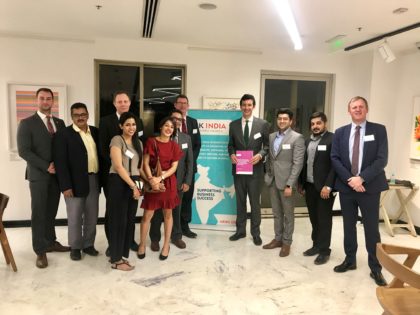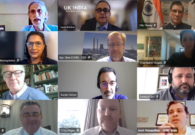Reflecting on UKIBC’s Higher Education Delegation
The UK India Business Council took its first Higher Education delegation to India from 29th October – 2nd November which was a great success and far exceeded our own expectations.

This inaugural delegation visited Delhi and Mumbai and was the next step in our ongoing Higher Education work to take forward our policy advocacy activities as well as catalyse new partnerships for UK universities with both Indian industry and academia.
Accordingly, we put together a holistic and diverse programme spanning the entire spectrum of higher education stakeholders including Indian universities, major Indian employers, relevant government bodies and students. We also included relevant historical and cultural elements in the itinerary to make it more enjoyable and deliver a 360-degree experience.
Delegates included senior representatives from the Universities of East Anglia, Surrey, Birmingham, London, Essex, Cardiff, and Eurocentres. We also saw targeted participation from Nottingham Trent University and the University of Bristol.
What we got up to:
Day 1 started off with an introductory market briefing in Delhi where the delegates were welcomed by the British High Commission and the British Council. On day 2, we participated in the FICCI Higher Education Summit where delegates got a chance to be panellists at various sessions and speak on important issues including innovation, new pathways to knowledge and university social responsibility. Later that evening, we launched our latest advocacy report titled ‘Beyond the Top 200: Effective International Collaboration for Indian Higher Education’ at a networking reception hosted by the British Council and attended by more than 50 representatives from top Indian universities and leading business figures.
This paper ‘Beyond the Top 200’ builds on our first report on India’s Education Policy (March 2018) and focuses on India’s need to expand its higher education system focusing on excellence, equal access and employability. Yet, based on the current plan, only the “top 200 in the world” are to be allowed to collaborate with the best Indian institutions – an approach which falls far short of meeting India’s needs.
Indian policy makers are right to only want the best the world has to offer. However, while International ranking systems are designed to help students choose where to study, they are not a suitable tool to judge which foreign universities have what India and Indians actually want. Frequently, universities that do not fall into the top 200 offer world-class courses, teaching, and facilities that directly meet India’s strategic needs. To truly unlock the potential of India’s young population, a more flexible and integrated approach is needed.
On Day 3 in Delhi, we were fortunate to be able to secure a private meeting with the MHRD’s Joint Secretary Mr Saravana Kumar and its Director Mr VK Siljo to discuss this report. Delegates also got an opportunity to discuss their individual areas of interest and hear from both government officials about the Ministry’s new policy initiatives to foster international research collaboration such as the ‘Scheme for Promotion of Academic and Research Collaboration’ (SPARC), which builds upon the existing ‘Global Initiative of Academic Networks’ (GIAN) scheme.

The industry roundtable was held at the British Council’s office and was attended by major employers including KPMG, Essar, the Hinduja Group, Perkins, Diageo, Barclays and HSBC to name a few. It was fascinating to hear about the new skill sets that these employers are seeking which, in turn, will require their HR strategies and systems to be much more flexible and visionary than they currently are.

The visit to the Indian School of Design and Innovation (ISDI) on the last day was a real eye-opener for the group. It was an excellent example of how a modern educational institute can marry cutting-edge teaching techniques with traditional values and industry expertise to tackle social problems while putting the student at the centre of the learning and development process.

Delegates were delighted by how open and willing the Vice Chancellor and his staff were to build relationships and explore partnerships, and promised to continue this dialogue in the weeks to come.

Looking ahead, our focus is clear – to leverage our resources and strengths to collectively convert these initial conversations into tangible, measurable outcomes that have a significant and positive impact on the higher education landscape in India.

 By Tara Panjwani
By Tara Panjwani 




